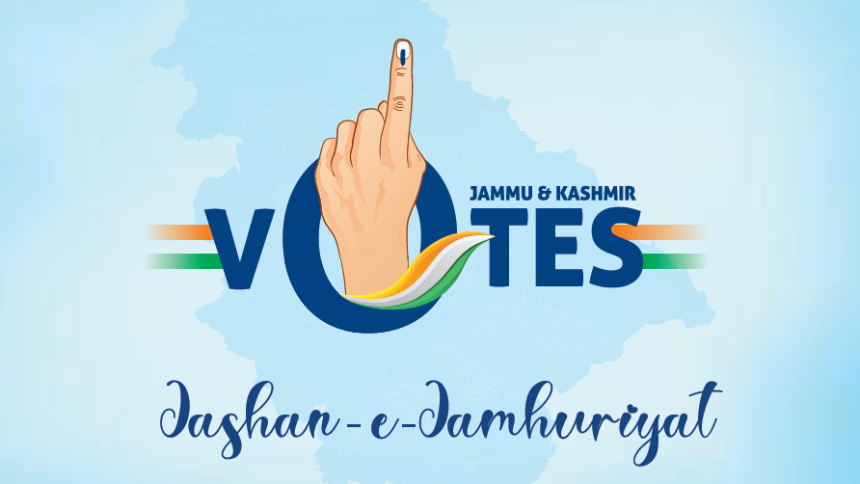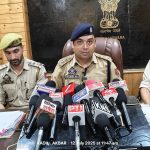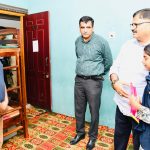William Randolph Hearst, the popular American newspaper publisher and politician, has stated, “News is what someone wants suppressed. Everything else is advertising.” In the wake of advertising for weeks by various political parties and independent candidates in the Jammu and Kashmir (J-K) Legislative Assembly election, the campaigning period officially ended on Sunday (September 29). Polling for the third and final phase is scheduled to end on October 1; all eyes will be on the results set to be announced on October 8.
Though a democratic government comes with its own bed of thorns, yet its existence is like backbone for all citizens: it enables them to breathe easy unless elected representatives have other ideas and indulge in the activities against public welfare. A major plus is that the populace can remain connected with the leaders, empowering them to feel a sense of belongingness.
In addition, people can smoothly lodge their complaints or voice their genuine demands to their chosen leaders. In response, the good public representatives keep themselves posted as to the concerns and issues confronting people and try to seek their speedy disposal. Bureaucratic excesses and deaf delays largely do not come in the way.
What is noteworthy is that the public representatives act as effective checks on the bureaucratic conduct and mechanism of work in the public institutions. This in a way acts as a healing touch for the people at large.
Without an elected government, it is a common experience that bureaucracy enjoys a field day. The resolving of problems and grievances of people becomes an uphill task because the unelected officials generally see respecting public opinion a pointless endeavor ; also seeking to gain and maintain credibility in public eyes does not look promising to the unelected officials.
Therefore, an elected government is a must-have organization. Not only does it act as a watchdog over a bureaucratic set-up but also cuts the latter to size if it oversteps the office bounds and does not play fair.
I have no quarrel with the argument that an elected government can also prove harmful to public interests if it chiefly prefers its own interest. Impartially speaking, J-K is hungry from decades together— if not angry — for the elected government that effectively deals with the rampant corruption of all shapes and sizes , huge tax evading population, alarming financial irregularities, countless non-paying electricity and water supply consumers , rising unemployed population, hordes of fake age serving employees (including the ones past their superannuation age ), disproportionate assets / expenses by the employees regardless of their rank. Include drug menace also.
In effect, the last elected government was viewed as the one having forgotten its responsibility towards the populace. It is believed that people heaved a sigh of relief when it discontinued beyond 2018 and looked forward to the subsequent presidential rule for healing their wounds. Has that happened or not is a moot point? And can be dealt separately.
For now with the new elected government expectedly taking the reins after October 8, people would like it to work day in, day out for their welfare and the safety of their life and property. On top should remain the governance through the rule of law; a new dawn must break.
One may argue that when an elected government assumes power in this part of the world, people continue to suffer under poor medical facilities, poor water supply, poor transport facilities and poor power supply. Also bribery, favoritism, delay tactics, exploitation and official highhandedness do not lose ground.
It is not to blow it out of proportions that in every mohalla, village, office and region, muscle power or money power or political power make the mare go. The big fishes devour the small fish on impunity. The loopholes in our laws are exploited to fleece the weaker and the disadvantaged sections of the society. Will the new dispensation turn the situation around?
In view of this horrendous experience with the elected government, people are not too enthusiastic with respect to the upcoming government. This is not to assert that the non- elected governments bear only bright side with nothing under par.
People in villages have very inadequate medical facilities to come to terms with. At most places, one finds no health center, no medicine and no doctor during a day or at night. So village residents in majority of cases have to bank on quacks for treatment. This puts their life at stake.
What is important is that public should live with comfort; the weak should live unexploited and with dignity. Those contesting for the first time are going overboard to serve people in good faith. But that is easier said than done. Nonetheless, their never say die attitude will be put to test if they assume office.
Pertinently, the most important question that remains is whether the electorate has sufficient political literacy to elect the most suitable leader to rule. As the outcome of the polls underway will be declared soon, it will be interesting to know the preferences of the voters.
A considerable improvement in health care, clean governance minus favor , significant reforms in public service delivery, reduction in unemployment figures, prevention of electricity and water supply theft , school education reforms and so on — all are what good citizens will vote for and good government would work to serve people with. Anything less is beating the dead horse.
Using the universal franchise, I too have cast my vote and my vote has preferred the election symbol which is not a square peg in a round hole. Have not I done well?
(Author is RK columnist and teacher by profession. Feedback: [email protected])








